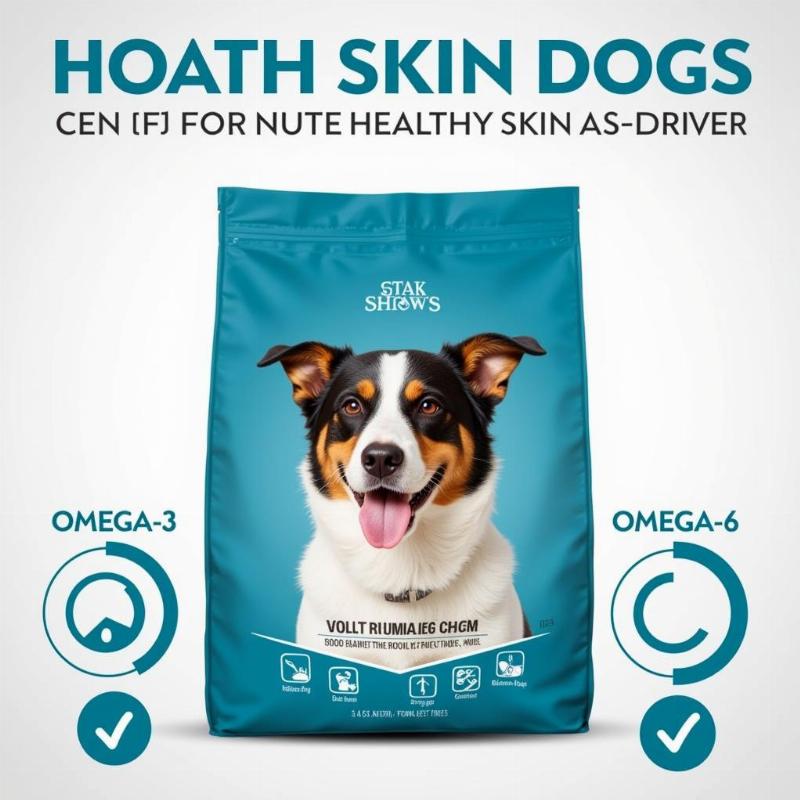Dry, flaky skin on your furry friend can be more than just a cosmetic issue. It can be a sign of underlying health problems or environmental factors. Understanding what helps with dogs dry skin involves addressing both potential causes and implementing effective remedies. This guide will explore everything from dietary adjustments and grooming practices to identifying allergies and seeking veterinary care.
Understanding the Causes of Dry Skin in Dogs
Several factors can contribute to canine dry skin. Diet plays a crucial role. A lack of essential fatty acids, like Omega-3 and Omega-6, can lead to dry, dull coats and itchy skin. Environmental factors, such as low humidity, excessive bathing with harsh shampoos, and exposure to allergens like pollen or dust mites, can also strip the skin of its natural oils. Certain breeds, like Bulldogs and Shar-Peis, are also predisposed to skin issues due to their wrinkles and folds.
Dietary Solutions for Dry Skin
 Dog Food Rich in Omega Fatty Acids
Dog Food Rich in Omega Fatty Acids
Boosting your dog’s intake of Omega fatty acids is often the first step. what helps with dry skin on dogs Look for dog foods specifically formulated for skin and coat health, or consider adding fish oil or flaxseed oil supplements to their diet. Always consult your veterinarian before introducing new supplements, especially if your dog has pre-existing health conditions. Adding a tablespoon of coconut oil to their food can also provide moisturizing benefits.
Grooming Practices to Soothe Dry Skin
Regular grooming is essential for maintaining healthy skin. what helps dry skin on dogs Use a moisturizing shampoo specifically designed for dogs with dry skin, avoiding harsh chemicals and fragrances. Oatmeal-based shampoos are often recommended for their soothing properties. Don’t over-bathe your dog, as this can strip away essential oils. Brushing your dog regularly helps distribute natural oils and removes dead skin cells.
Identifying and Managing Allergies
Allergies are a common culprit behind canine dry skin. what helps dogs with dry skin Food allergies, environmental allergies (like pollen, dust mites, and mold), and flea allergies can all cause itching and inflammation, leading to dry, irritated skin. If you suspect your dog has allergies, consult your veterinarian. They can perform allergy testing to pinpoint the specific allergens and recommend appropriate treatment, which might include medication, hypoallergenic diets, or immunotherapy.
When to Seek Veterinary Care
While many cases of dry skin can be managed at home, some require veterinary intervention. what helps dry skin in dogs If your dog’s dry skin is accompanied by excessive itching, hair loss, redness, sores, or any other signs of discomfort, it’s crucial to seek professional advice. Your veterinarian can diagnose underlying medical conditions, such as hypothyroidism, bacterial infections, or parasitic infestations, which may be contributing to the dry skin.
Dr. Emily Carter, DVM, emphasizes: “Don’t underestimate the impact of diet on skin health. A balanced diet rich in Omega fatty acids is foundational for a healthy coat and can significantly improve dry skin.”
Dr. David Miller, DVM, adds: “Regular grooming with appropriate products is essential for managing dry skin, but avoid over-bathing, as it can exacerbate the problem.”
Conclusion
Addressing dry skin in dogs requires a multifaceted approach. By understanding the potential causes, implementing dietary and grooming adjustments, and seeking veterinary care when necessary, you can help your furry friend achieve healthy, comfortable skin. Remember to consult your veterinarian for personalized advice based on your dog’s specific needs.
FAQ
- How often should I bathe my dog with dry skin? Bathe your dog only when necessary, using a moisturizing shampoo. Over-bathing can worsen dry skin.
- What are the signs of a food allergy in dogs? Common signs include itching, skin infections, ear infections, and gastrointestinal issues.
- Can I use human moisturizer on my dog? No, human moisturizers can contain ingredients that are toxic to dogs. Use products specifically formulated for pets.
- How can I increase humidity for my dog in dry climates? Using a humidifier can help add moisture to the air and alleviate dry skin.
- Are certain dog breeds more prone to dry skin? Yes, breeds like Bulldogs, Shar-Peis, and Cocker Spaniels are more susceptible.
- Can fleas cause dry skin in dogs? Yes, flea bites can cause allergic reactions leading to itching and dry skin.
- How long does it take for a dog’s dry skin to improve with treatment? Improvement can vary, but you may see positive changes within a few weeks of consistent treatment.
Related Articles
Beautdogs.us is your premier online destination for all things dog-related in the USA. We offer expert advice on dog breeds, care, and product recommendations. Whether you’re a new dog owner or a seasoned pro, Beautdogs.us is your trusted source for comprehensive and engaging information on dog companionship and well-being. Contact us for all your dog-related queries: Email: [email protected], Phone: +1 501-555-7529. Visit Beautdogs.us today!